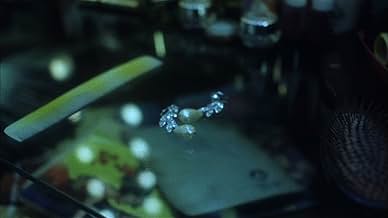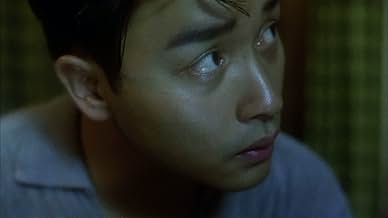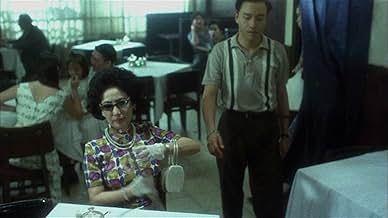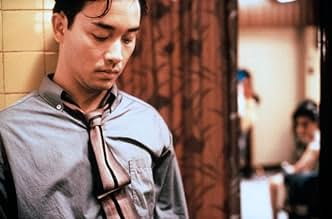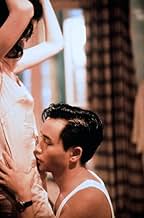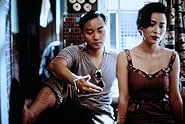IMDb रेटिंग
7.4/10
27 हज़ार
आपकी रेटिंग
अपनी भाषा में प्लॉट जोड़ेंA man tries to find out who his real mother is after the woman who raised him tells him the truth.A man tries to find out who his real mother is after the woman who raised him tells him the truth.A man tries to find out who his real mother is after the woman who raised him tells him the truth.
- पुरस्कार
- 17 जीत और कुल 9 नामांकन
Rebecca Pan
- Rebecca
- (as Tik-Wa Poon)
Tony Leung Chiu-wai
- Chow Mo-wan
- (as Tony Chiu Wai Leung)
फ़ीचर्ड समीक्षाएं
Many people here seem to be of the opinion that this film is not very typical of Wong's work. I would like to disagree. To me, this film is a very typical Wong film. That is, if you are expecting the absolutely perfect colours, pictures and frames of 'In the Mood for Love', you will be disappointed. This film, like many of his other films, has a more rough quality to it.
All you who have seen 'In the Mood' and liked it should really see this film, as I don't think you can understand 'In the Mood' without having seen this one. I was not particularly overwhelmed by 'In the Mood', but now that I have seen this film, I at least understand the later film better. So maybe also those who did not like 'In the Mood' should see this one, as it might change their perception of that film.
To me Wong Kar-Wai's best film is still Chungking Express. And this film, although kind of in line with that film, does not reach up to that standard. I am glad I saw this film, as it explains other parts of Wong's work to me, but were it not for the sake of understanding that bigger picture, I don't think I would recommend it.
All you who have seen 'In the Mood' and liked it should really see this film, as I don't think you can understand 'In the Mood' without having seen this one. I was not particularly overwhelmed by 'In the Mood', but now that I have seen this film, I at least understand the later film better. So maybe also those who did not like 'In the Mood' should see this one, as it might change their perception of that film.
To me Wong Kar-Wai's best film is still Chungking Express. And this film, although kind of in line with that film, does not reach up to that standard. I am glad I saw this film, as it explains other parts of Wong's work to me, but were it not for the sake of understanding that bigger picture, I don't think I would recommend it.
This film was directed by the Chinese director, Wong Kar-Wai, who came to Western attention through his strange and quirky CHUNGKING EXPRESS. Because it was such an unusual and unique film, I decided to watch this other film. And, as in CHUNKING EXPRESS, DAYS OF BEING WILD was indeed a very unusual film--though with none of the kooky sensibilities of the other movie.
The film begins with a man trying to slowly ingratiate himself to a rather shy lady. Slowly but surely he is able to bring her out of her shell and after months of grooming her, he is able to bed her. To him, it's all a game and he has absolutely no regard for her or any other woman. But this nice lady is shattered and he could care less. Later, you see him pretty much doing the same thing in another self-centered relationship. While this is moderately interesting, what makes it even more so is his relationship with his foster mom. Their sick and dysfunctional interactions tell much about why he is who he is. The rest of the film concerns both of them as they separate and go their ways.
The DVD case compared this movie to the French film, LA RONDE. In most ways, this is very unfortunate, as both movies are excellent on their own and Wong Kar-Wai's film is not derivative. The only major similarities I saw is that both films involved sex and also showed how the two people at the beginning later had impact on others' behaviors as well. LA RONDE was about a large group of people and how sex (and an STD) unites them, while DAYS OF BEING WILD is about connections--and how some are unable to have deep or meaningful relationships. In this sense, it's a standout film. However, unfortunately, this also makes it a rather unpleasant film and is a bit difficult to watch--definitely NOT a date movie! It simply is NOT a fun film. But for someone who wants something with insights and is well directed and written, this is a film well worth seeing.
NOTE--While this film is about sexuality and the DVD case looks very steamy, there is no nudity in the film. This actually might be an excellent film for teens to see with their parents, as it opens up a great opportunity to talk about intimacy and sexuality--and how some cannot or will not combine the two.
The film begins with a man trying to slowly ingratiate himself to a rather shy lady. Slowly but surely he is able to bring her out of her shell and after months of grooming her, he is able to bed her. To him, it's all a game and he has absolutely no regard for her or any other woman. But this nice lady is shattered and he could care less. Later, you see him pretty much doing the same thing in another self-centered relationship. While this is moderately interesting, what makes it even more so is his relationship with his foster mom. Their sick and dysfunctional interactions tell much about why he is who he is. The rest of the film concerns both of them as they separate and go their ways.
The DVD case compared this movie to the French film, LA RONDE. In most ways, this is very unfortunate, as both movies are excellent on their own and Wong Kar-Wai's film is not derivative. The only major similarities I saw is that both films involved sex and also showed how the two people at the beginning later had impact on others' behaviors as well. LA RONDE was about a large group of people and how sex (and an STD) unites them, while DAYS OF BEING WILD is about connections--and how some are unable to have deep or meaningful relationships. In this sense, it's a standout film. However, unfortunately, this also makes it a rather unpleasant film and is a bit difficult to watch--definitely NOT a date movie! It simply is NOT a fun film. But for someone who wants something with insights and is well directed and written, this is a film well worth seeing.
NOTE--While this film is about sexuality and the DVD case looks very steamy, there is no nudity in the film. This actually might be an excellent film for teens to see with their parents, as it opens up a great opportunity to talk about intimacy and sexuality--and how some cannot or will not combine the two.
There is a two-minute action sequence, but that is NOT what this masterpiece is about. 'Days of being wild' has to be the best film of Wong Kar-Wai or at least MY favourite. There are three stories (in one) that feel like film-noir now and then, but are principally about the distance in several different relationships. Kar-Wai lets his characters struggle with urban loneliness and lets them search indefinitely, unable to settle down. They only have the chance to create 'One Minute Friendships' that might seem magic but don't offer satisfaction and have to be ended. The quest continues. Won Kar-Wai poses the question whether you have lived actually when you've searched all your life for friendship/love. Two or three voice-overs scarcely help the portrayal of the characters, but only when the story allows it. I prefer this film over Chungking Express anytime. One reason for that is the great use of music here, while his other films tend to drown in the excessive use of western music. The acting is also really brilliant in this eclectic work.
Subtle and masterly cinematography by Christopher Doyle (Chungking Express, Fallen Angels '95): less colorful than 'In the mood for love', but therefore more applicable for the fifties. Moreover, the dynamics are also much more subtle than everything Kar-Wai and Doyle have done up till now. In contrast: Happy Together and Fallen Angels were brilliantly photographed because there it was more appropriate to use dynamic cinematography (more temperament). It's only Kar-Wai's second film but still his most solid and memorable and maybe even more internationally appealing than 'In the mood for love', without making compromises or getting sentimental. I just can't think of anything that is not good in 'Days of being wild'.
10 points out of 10 :-)
Subtle and masterly cinematography by Christopher Doyle (Chungking Express, Fallen Angels '95): less colorful than 'In the mood for love', but therefore more applicable for the fifties. Moreover, the dynamics are also much more subtle than everything Kar-Wai and Doyle have done up till now. In contrast: Happy Together and Fallen Angels were brilliantly photographed because there it was more appropriate to use dynamic cinematography (more temperament). It's only Kar-Wai's second film but still his most solid and memorable and maybe even more internationally appealing than 'In the mood for love', without making compromises or getting sentimental. I just can't think of anything that is not good in 'Days of being wild'.
10 points out of 10 :-)
In Wong Kar-wai's 1991 film Days of Being Wild, Yuddy (Leslie Cheung), a charming drifter captures the attention of store attendant Su Lizhen (Maggie Cheung) by asking her to look at his watch. When she sees that it says one minute before 3:00PM on April 16, 1960, he tells her that she will never forget the moment and will dream about him that night. The next time they meet, the moment becomes two, then one hour, then weeks and months but Yuddy is like the mythical bird with no legs that just flies and flies and never lands. Abandoned by his real mother and brought up by a wealthy alcoholic courtesan (Rebecca Pan), he does not know where he came from or where he is going. He treats women with little respect, discarding them when they no longer serve his purpose. When one lover asks him if he loves her, he tells her that during his life he will be friends with many, many women but won't know whom he truly loves until the end.
Days of Being Wild unfolds like a dream with color filters, unusual shadows, and the sights and sounds of Hong Kong's rainy nights and sweltering summers. Based on the director's memories from his childhood and admiration for the style of Argentinean novelist Manuel Puig (Heartbreak Tango), the film is a series of episodes involving six people who touch each other's lives. After his short-lived relationship with Su, Yuddy meets a cabaret dancer who calls herself Mimi (Carina Lau) but their relationship fares no better and she is left to suffer the consequences of their breakup. Meanwhile, Su meets Tide (Andy Lau), a gentle policeman whom she is able to confide until he suddenly leaves Hong Kong to become a sailor. Each character seeks a sense of identity and fulfillment. After Rebecca tells him of her plans to move to America with her boyfriend, she finally lets him know who and where his real mother is. After Yuddy goes to the Philippines to try to find his mother, the lives of the main protagonists come together in a powerful conclusion.
Days of Being Wild may sound like a soap opera but the film reaches a much higher artistic level. Supported by outstanding performances by Leslie Cheung, Maggie Cheung, and Jacky Cheung as Yuddy's only friend Zeb, it is a tone poem about longing and one's search for identity. We care about the characters even though they don't seem to care about themselves. Like many of us, they pine for the things that might have been, the word that was never said, and the love that remains elusive. A commercial failure but an artistic triumph, Days of Being Wild is a moody, atmospheric film that with its background of popular music, in this case 1950's rumbas and cha-cha's, forecasts the director's later In the Mood For Love. As a beautifully realized example of alienated people desperately seeking their place in the world, however, it stands securely on its own.
Days of Being Wild unfolds like a dream with color filters, unusual shadows, and the sights and sounds of Hong Kong's rainy nights and sweltering summers. Based on the director's memories from his childhood and admiration for the style of Argentinean novelist Manuel Puig (Heartbreak Tango), the film is a series of episodes involving six people who touch each other's lives. After his short-lived relationship with Su, Yuddy meets a cabaret dancer who calls herself Mimi (Carina Lau) but their relationship fares no better and she is left to suffer the consequences of their breakup. Meanwhile, Su meets Tide (Andy Lau), a gentle policeman whom she is able to confide until he suddenly leaves Hong Kong to become a sailor. Each character seeks a sense of identity and fulfillment. After Rebecca tells him of her plans to move to America with her boyfriend, she finally lets him know who and where his real mother is. After Yuddy goes to the Philippines to try to find his mother, the lives of the main protagonists come together in a powerful conclusion.
Days of Being Wild may sound like a soap opera but the film reaches a much higher artistic level. Supported by outstanding performances by Leslie Cheung, Maggie Cheung, and Jacky Cheung as Yuddy's only friend Zeb, it is a tone poem about longing and one's search for identity. We care about the characters even though they don't seem to care about themselves. Like many of us, they pine for the things that might have been, the word that was never said, and the love that remains elusive. A commercial failure but an artistic triumph, Days of Being Wild is a moody, atmospheric film that with its background of popular music, in this case 1950's rumbas and cha-cha's, forecasts the director's later In the Mood For Love. As a beautifully realized example of alienated people desperately seeking their place in the world, however, it stands securely on its own.
Though it has been argued that 'A Fei Zheng Chuan' (aka 'Days of Being Wild') is the first set of the trilogy which is completed by 'Fa Yeung Nin Wa' (aka 'In the Mood For Love') and '2046', it 'looks' different from the other two films. Kar Wai uses less colour, more shadow, rain and heat and more rawness. The tone is much darker than in 'Fa Yeung Nin Wa' as the film is set in the 50s. The music is beautiful and effectively used. And, here too Kar Wai ends up making a powerful product. Though this film was a box office failure, it is an artistic victory.
'A Fei Zheng Chuan' tells the story of 6 individuals whose lives are interconnected by each character's search and struggle for an identity. It's about loneliness, unrequited love, lost love, the search for love, and how the search continues. Kar Wai clevely brings up the theme of sex (without showing any nudity). The writing is excellent and the characterization is strengthened by superb and unique performances. The late Leslie Cheung's Yuddy is not a very likable person but we do sympathize with this man and recognize him. Maggie Cheung as Su gives one of the most subtle and finest performances. Carina Lau is energetic and terrific as Mimi. Rebecca Pan gracefully downplays her part. Andy Lau's Tide and Jacky Cheung's Zeb too are relatable and the actors are nothing short of remarkable. Actually, I recognize all the characters in this film.
I loved the cinematography, especially the long shots. One of my favorite shot is the introduction of the scene that glides from the Phillipine streets to Yuddy and Tide in a lunch bar. This is one fine example of skillful camera-work. The shaky camera (which thankfully isn't overdone) and the close-ups that mostly take place during conversations and intimate moments between two characters work very well. Doyle's camera-work simply guides us through the lives of these characters.
Summing it up, 'A Fei Zheng Chuan' works on many levels. It is an excellent study of characters, it 'tells' a universal story in a poetic way and it is a fine cinematic experience.
A bird that never lands will one day suddenly seize to exist.
'A Fei Zheng Chuan' tells the story of 6 individuals whose lives are interconnected by each character's search and struggle for an identity. It's about loneliness, unrequited love, lost love, the search for love, and how the search continues. Kar Wai clevely brings up the theme of sex (without showing any nudity). The writing is excellent and the characterization is strengthened by superb and unique performances. The late Leslie Cheung's Yuddy is not a very likable person but we do sympathize with this man and recognize him. Maggie Cheung as Su gives one of the most subtle and finest performances. Carina Lau is energetic and terrific as Mimi. Rebecca Pan gracefully downplays her part. Andy Lau's Tide and Jacky Cheung's Zeb too are relatable and the actors are nothing short of remarkable. Actually, I recognize all the characters in this film.
I loved the cinematography, especially the long shots. One of my favorite shot is the introduction of the scene that glides from the Phillipine streets to Yuddy and Tide in a lunch bar. This is one fine example of skillful camera-work. The shaky camera (which thankfully isn't overdone) and the close-ups that mostly take place during conversations and intimate moments between two characters work very well. Doyle's camera-work simply guides us through the lives of these characters.
Summing it up, 'A Fei Zheng Chuan' works on many levels. It is an excellent study of characters, it 'tells' a universal story in a poetic way and it is a fine cinematic experience.
A bird that never lands will one day suddenly seize to exist.
क्या आपको पता है
- ट्रिवियाThe film was supposed to be the first part of a project. But due to its relatively poor performance at the box office when it was first released, the producers decided not to finish the second part. The nameless character that appears in the last scene played by Tony Leung Chiu-wai is supposedly the main character in the second part.
- गूफ़When Tide checks into the hotel, the hotel manageress hands him the key to Room 206. However, in the next scene, Tide uses the key to enter Room 204. This, however, may not be so much a 'goof' as another recurrence of the number '2046' seen so often in Wong Kar-Wai's films.
- इसके अलावा अन्य वर्जनA different 35mm print of the film features an altered prologue sequence and different edits during the final scenes of the film. This version decreases the length of the film from 95 to 94 minutes.
- कनेक्शनFeatured in Nian ni ru xi (1997)
- साउंडट्रैकJungle Drums (Cantonese cover)
Music by Ernesto Lecuona & J. Cacabas
Lyrics by Sharon Chung
Performed by Anita Mui
टॉप पसंद
रेटिंग देने के लिए साइन-इन करें और वैयक्तिकृत सुझावों के लिए वॉचलिस्ट करें
- How long is Days of Being Wild?Alexa द्वारा संचालित
विवरण
- रिलीज़ की तारीख़
- कंट्री ऑफ़ ओरिजिन
- आधिकारिक साइट
- भाषाएं
- इस रूप में भी जाना जाता है
- The True Story of a Hoodlum
- फ़िल्माने की जगहें
- उत्पादन कंपनी
- IMDbPro पर और कंपनी क्रेडिट देखें
बॉक्स ऑफ़िस
- US और कनाडा में सकल
- $1,46,310
- US और कनाडा में पहले सप्ताह में कुल कमाई
- $18,090
- 21 नव॰ 2004
- दुनिया भर में सकल
- $32,57,906
- चलने की अवधि1 घंटा 35 मिनट
- रंग
- पक्ष अनुपात
- 1.85 : 1
इस पेज में योगदान दें
किसी बदलाव का सुझाव दें या अनुपलब्ध कॉन्टेंट जोड़ें



